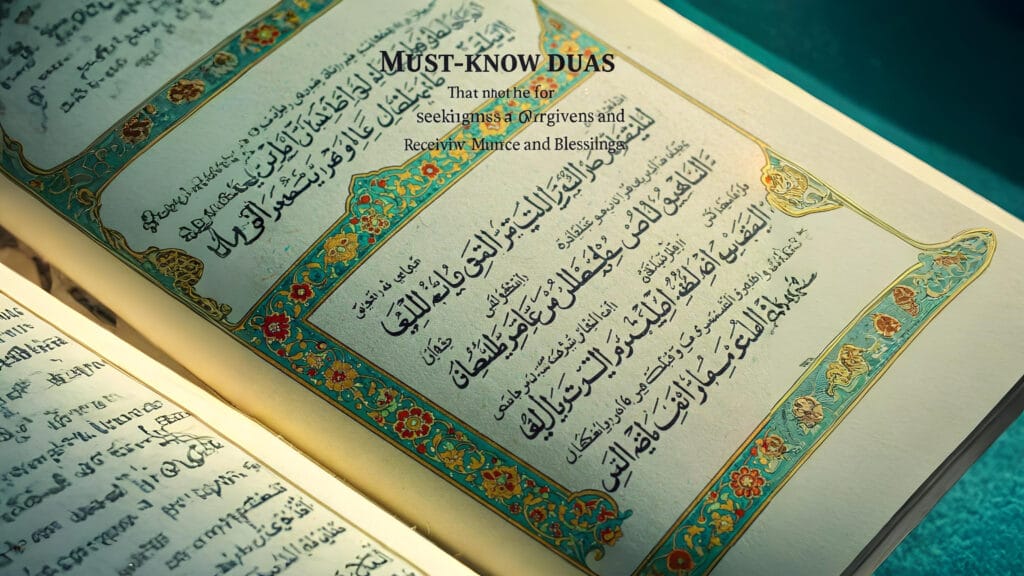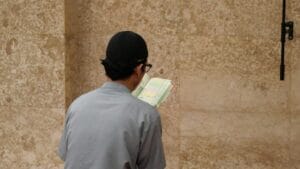In Islam, seeking forgiveness from Allah (SWT) is a cornerstone of spiritual growth and a pathway to attaining divine mercy and blessings. The act of supplication, known as dua, serves as a direct line of communication between a believer and their Creator. Whether you’re seeking forgiveness for minor missteps or major sins, reciting powerful duas with sincerity can purify your heart, strengthen your faith, and bring you closer to Allah’s boundless compassion. This comprehensive guide explores the must-know duas for seeking forgiveness, their significance, practical tips for incorporating them into daily life, and resources for deepening your understanding of Islamic supplications.

Introduction: The Power of Dua in Seeking Forgiveness
Forgiveness is at the heart of Islamic teachings. The Quran and Hadith emphasize that Allah (SWT) is Al-Ghafoor (The Most Forgiving) and Ar-Raheem (The Most Merciful), always ready to pardon those who turn to Him with genuine repentance. The Prophet Muhammad (PBUH) said, “The one who repents for a sin is like the one who has not committed a sin” (al-Bayhaqi and Ibn Majah). This profound statement underscores the transformative power of seeking forgiveness through dua.
In this article, we’ll dive into:
- Key duas for forgiveness and mercy, including their Arabic text, transliteration, and translation.
- The spiritual and psychological benefits of istighfar (seeking forgiveness).
- Practical ways to incorporate these duas into your daily routine.
- Resources, including books, apps, and online courses, to deepen your knowledge.
- Reviews and ratings of recommended resources.
- A fee structure for premium Islamic learning platforms.
- Tips for writing a blog post about duas with SEO optimization.
Whether you’re a lifelong Muslim or a new revert, this guide will equip you with the tools to seek Allah’s mercy and blessings through heartfelt supplications.
Read more:
Why Seeking Forgiveness Matters in Islam
The Spiritual Significance of Istighfar
Istighfar, the act of seeking forgiveness, is more than just asking for pardon; it’s a way to purify the soul and renew one’s commitment to Allah (SWT). The Quran states, “Indeed, Allah loves those who are constantly repentant and loves those who purify themselves” (Surah Al-Baqarah 2:222). By regularly reciting duas for forgiveness, Muslims acknowledge their human imperfections and express reliance on Allah’s mercy.
The Prophet Muhammad (PBUH) himself sought forgiveness over 70 times a day, despite being sinless, to set an example for his Ummah (Sahih Bukhari). This practice highlights the importance of istighfar as a daily act of worship that opens the doors to divine blessings, protection, and sustenance.
Psychological and Emotional Benefits
Beyond its spiritual rewards, seeking forgiveness through dua offers emotional relief. It helps believers release guilt, reduce anxiety, and find peace in Allah’s mercy. The Quran assures, “Those who have faith and whose hearts find peace in the remembrance of Allah, Truly it is in the Remembrance of Allah that hearts find peace” (Quran 13:28). Reciting duas fosters mindfulness, gratitude, and a sense of hope, knowing that Allah’s forgiveness is always within reach.
Must-Know Duas for Forgiveness and Mercy
Below are some of the most powerful duas for seeking forgiveness and receiving Allah’s mercy and blessings. Each dua is presented with its Arabic text, transliteration, translation, and context for easy understanding and memorization.
1. Sayyidul Istighfar (The Master Supplication for Forgiveness)
This dua is considered the most superior way to seek forgiveness. The Prophet (PBUH) said, “Whoever says it during the day with firm faith in it and dies on the same day before the evening, he will be from the people of Paradise” (Sahih Al-Bukhari).
Arabic:
اللَّهُمَّ أَنْتَ رَبِّي لا إِلَهَ إِلا أَنْتَ، خَلَقْتَنِي وَأَنَا عَبْدُكَ، وَأَنَا عَلَى عَهْدِكَ وَوَعْدِكَ مَا اسْتَطَعْتُ، أَعُوذُ بِكَ مِنْ شَرِّ مَا صَنَعْتُ، أَبُوءُ لَكَ بِنِعْمَتِكَ عَلَيَّ، وَأَبُوءُ بِذَنْبِي فَاغْفِرْ لِي فَإِنَّهُ لا يَغْفِرُ الذُّنُوبَ إِلا أَنْتَ
Transliteration:
Allahumma anta Rabbi la ilaha illa anta, Khalaqtani wa ana abduka, wa ana ala ahdika wa wadika ma astatat. Audhu bika min sharri ma sanatu, abu’u laka bi nimatika `alayya wa abu’u laka bi dhanbi, faghfir li fa innahu la yaghfirudh-dhunub illa anta.
Translation:
O Allah, You are my Lord, there is no deity but You. You created me, and I am Your servant, and I abide by Your covenant and promise as best as I can. I seek refuge in You from the evil of what I have done. I acknowledge Your favor upon me, and I acknowledge my sin, so forgive me, for verily none can forgive sins except You.
When to Recite:
- Morning and evening for protection and blessings.
- After committing a sin to seek immediate forgiveness.
2. Simple Istighfar
This short yet powerful dua can be recited anytime, anywhere.
Arabic:
أَسْتَغْفِرُ اللَّهَ
Transliteration:
Astaghfirullah
Translation:
I seek forgiveness from Allah.
When to Recite:
- After prayers (recommended to say three times).
- Throughout the day to maintain a state of repentance.
3. Dua of Prophet Adam and Hawwa (AS)
This dua was recited by Prophet Adam and Hawwa (AS) after they disobeyed Allah in Paradise, seeking His mercy.
Arabic:
رَبَّنَا ظَلَمْنَا أَنْفُسَنَا وَإِنْ لَمْ تَغْفِرْ لَنَا وَتَرْحَمْنَا لَنَكُونَنَّ مِنَ الْخَاسِرِينَ
Transliteration:
Rabbana zalamna anfusana wa-in lam taghfir lana wa-tarhamna la-nakunanna minal-khasirin
Translation:
Our Lord! We have wronged ourselves. If You do not forgive us and have mercy on us, we will certainly be lost.
When to Recite:
- When feeling overwhelmed by guilt or regret.
- During moments of reflection and repentance.
4. Dua for Forgiveness and Mercy
This dua combines a plea for forgiveness with a request for Allah’s mercy and blessings.
Arabic:
أَنْتَ وَلِيُّنَا فَاغْفِرْ لَنَا وَارْحَمْنَا ۖ وَأَنْتَ خَيْرُ الْغَافِرِينَ وَاكْتُبْ لَنَا فِي هَٰذِهِ الدُّنْيَا حَسَنَةً وَفِي الْآخِرَةِ إِنَّا هُدْنَا إِلَيْكَ
Transliteration:
Anta waliyyuna faghfirlana warhamna waanta khayru alghafireen. Waktub lana fee hathihi ddunya hasanatan wafee al-akhiratiinna hudna ilayk
Translation:
You are our Protector, so forgive us and have mercy upon us; and You are the best of forgivers. And ordain for us good in this world, and in the Hereafter. Certainly we have turned unto You.
When to Recite:
- During difficult times to seek Allah’s guidance and mercy.
- In daily prayers for spiritual growth.
5. Dua for Forgiveness Between Sujood
Recited between the two prostrations during Salah, this dua is a beautiful way to seek forgiveness.
Arabic:
رَبِّ اغْفِرْ لِي، وَارْحَمْنِي، وَاجْبُرْنِي، وَارْفَعْنِي، وَارْزُقْنِي، وَاهْدِنِي، وَعَافِنِي، وَاعْفُ عَنِّي
Transliteration:
Rabbighfirli, warhamni, wajburni, warfa’ni, warzuqni, wahdini, wa’afini, wa’fu’anni
Translation:
My Lord, forgive me, have mercy on me, cover my shame, raise my rank, give me sustenance, guide me, make me healthy, and pardon me.
When to Recite:
- During Salah, between the two sujood (prostrations).
How to Incorporate Duas into Your Daily Life
To make duas a consistent part of your routine, consider these practical tips:
- Set a Daily Reminder: Use a prayer app like Athan or Muslim Pro to remind you to recite duas in the morning, evening, or after prayers.
- Memorize Short Duas: Start with simple supplications like “Astaghfirullah” and gradually learn longer ones like Sayyidul Istighfar.
- Reflect on Your Actions: Before reciting a dua, take a moment to reflect on your day and sincerely repent for any shortcomings.
- Combine with Good Deeds: Pair istighfar with acts of charity, as giving sadaqah can amplify your plea for forgiveness.
- Create a Dua Journal: Write down your favorite duas and their meanings to deepen your connection with them.
The Four R’s of Repentance
For duas to be effective, they must be accompanied by sincere repentance (tawbah). Scholars outline four key steps, often called the “Four R’s” of repentance:
- Remorse: Feel genuine regret for your sins.
- Repent: Verbally ask Allah for forgiveness through dua.
- Resolve: Make a firm intention to avoid the sin in the future.
- Repair: If your sin harmed others, seek to make amends (e.g., returning stolen property or apologizing).
By following these steps, your duas become a powerful tool for spiritual renewal.
Resources for Learning Duas
To deepen your knowledge of duas and istighfar, consider these highly rated resources:
1. Books
- “Fortress of the Muslim” by Sa’id bin Ali bin Wahf Al-Qahtani
- Description: A pocket-sized compilation of authentic duas for various occasions, including forgiveness.
- Rating: 4.8/5 (Amazon reviews).
- Price: $5–$10 (paperback).
- Why Choose It: Easy to carry, with Arabic, transliteration, and translation.
- “Du’a: The Weapon of the Believer” by Yasir Qadhi
- Description: An in-depth exploration of the etiquette and power of dua in Islam.
- Rating: 4.7/5 (Goodreads).
- Price: $12–$15.
- Why Choose It: Combines scholarly insights with practical advice.
2. Mobile Apps
- Athan: Prayer Times & Quran
- Features: Includes a dua section with audio recitations and translations.
- Rating: 4.6/5 (Google Play).
- Price: Free with in-app purchases.
- Review: “The dua section is very user-friendly, and the audio helps with pronunciation” (user review).
- Muslim Pro
- Features: Offers a comprehensive dua library and daily reminders.
- Rating: 4.5/5 (App Store).
- Price: Free; Premium subscription at $9.99/year.
- Review: “Great for beginners learning duas, but the premium version is worth it for ad-free access” (user review).
3. Online Courses
- SeekersGuidance: Introduction to Islamic Supplications
- Description: A free online course covering the etiquette and significance of dua.
- Rating: 4.9/5 (based on student feedback).
- Price: Free.
- Why Choose It: Taught by qualified scholars with a focus on practical application.
- Al-Maghrib Institute: Dua Masterclass
- Description: A paid course exploring advanced dua techniques and their spiritual impact.
- Rating: 4.8/5 (student reviews).
- Price: $99–$150 (varies by location).
- Why Choose It: Interactive and in-depth, ideal for serious learners.
Fee Structure for Premium Resources
| Resource | Type | Price | Notes |
|---|---|---|---|
| Fortress of the Muslim | Book | $5–$10 | Available on Amazon |
| Du’a: The Weapon of the Believer | Book | $12–$15 | Available at Islamic bookstores |
| Athan Premium | App | $9.99/year | Ad-free experience |
| Muslim Pro Premium | App | $9.99/year | Includes exclusive content |
| SeekersGuidance Course | Online Course | Free | Donations encouraged |
| Al-Maghrib Dua Masterclass | Online Course | $99–$150 | Discounts for early registration |
Reviews and Ratings of Recommended Resources
Fortress of the Muslim
- Pros: Compact, affordable, and comprehensive. Ideal for daily use.
- Cons: Small font size may be challenging for some readers.
- User Review: “I carry this book everywhere! The duas for forgiveness are easy to find and memorize” (Amazon, 5/5).
Athan App
- Pros: User-friendly interface, audio recitations, and multilingual support.
- Cons: Ads in the free version can be intrusive.
- User Review: “The dua section is a lifesaver for busy days. I love the reminders!” (Google Play, 4/5).
SeekersGuidance Course
- Pros: Free, accessible, and taught by reputable scholars.
- Cons: Requires self-discipline to complete.
- User Review: “This course transformed how I approach dua. Highly recommend!” (Student feedback, 5/5).
SEO Tips for Writing a Blog Post About Duas
If you’re creating a blog post like this one for your website, follow these SEO best practices to boost visibility:
- Use Targeted Keywords:
- Primary keyword: “Duas for seeking forgiveness”
- Secondary keywords: “Islamic duas for mercy,” “powerful istighfar duas,” “Allah’s blessings through dua.”
- Include keywords in the title, meta description, headings, and throughout the content (aim for 1–2% keyword density).
- Optimize Meta Description:
- Example: “Discover powerful Islamic duas for seeking forgiveness and receiving Allah’s mercy and blessings. Learn their meanings, benefits, and how to incorporate them into daily life.”
- Use Headings (H1, H2, H3):
- Structure your content with clear headings to improve readability and SEO.
- Example: H1 for the main title, H2 for sections like “Must-Know Duas,” H3 for specific duas.
- Add Internal and External Links:
- Link to other blog posts on your site (e.g., “How to Perform Tawbah” or “Benefits of Daily Dhikr”).
- Include credible external links to sources like IslamicFinder or SeekersGuidance.
- Incorporate Visuals:
- Add images of Arabic calligraphy or serene Islamic backgrounds to enhance engagement.
- Use alt text for images (e.g., “Arabic text of Sayyidul Istighfar dua”).
- Write for Your Audience:
- Address reader pain points, such as guilt over sins or a desire for spiritual growth.
- Use a conversational tone to connect with readers.
- Encourage Engagement:
- End with a call-to-action (e.g., “Share your favorite dua in the comments!”).
- Add social sharing buttons to increase reach.
Addressing Common Questions About Duas
Can I Recite Duas in My Native Language?
Yes, Allah (SWT) understands all languages. While reciting duas in Arabic is highly recommended for their authenticity and blessings, you can also make personal supplications in your native language, especially when expressing heartfelt emotions.
How Often Should I Seek Forgiveness?
The Prophet (PBUH) sought forgiveness 70–100 times daily, so aim to make istighfar a regular habit. Recite short duas like “Astaghfirullah” throughout the day and longer ones like Sayyidul Istighfar in the morning and evening.
What If I Feel My Sins Are Too Great?
The Quran reassures, “Say, ‘O My servants who have transgressed against themselves [by sinning], do not despair of the mercy of Allah. Indeed, Allah forgives all sins’” (Surah Az-Zumar 39:53). No sin is too great for Allah’s mercy, as long as you repent sincerely.
Conclusion: Embrace Allah’s Mercy Through Dua
Seeking forgiveness through duas is a powerful act of worship that brings Muslims closer to Allah (SWT). By reciting these supplications with sincerity, reflecting on your actions, and striving to improve, you can unlock the doors to divine mercy, blessings, and spiritual peace. Whether you’re reciting the profound Sayyidul Istighfar or the simple “Astaghfirullah,” each dua is a step toward purifying your heart and strengthening your faith.
Start incorporating these duas into your daily routine today, and explore the recommended resources to deepen your understanding. Share this guide with others to spread the blessings of istighfar, and let us know your favorite dua for forgiveness in the comments below!
Call-to-Action: Subscribe to our newsletter for more Islamic content, and download our free Dua Guide PDF to keep these supplications at your fingertips. May Allah (SWT) accept your repentance and shower you with His mercy and blessings. Ameen.














Post Comment